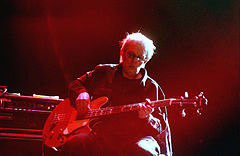Jack Casady
| Jack Casady | |
|---|---|

Casady playing on his signature bass with Hot Tuna in 2005.
|
|
| Background information | |
| Birth name | John William Casady |
| Born |
April 13, 1944 Washington, D.C., US |
| Genres | Rock, blues |
| Instruments | Bass guitar |
| Years active | 1964–present |
| Associated acts | Jefferson Airplane, Hot Tuna, Moonalice, Jimi Hendrix, SVT, Roky Erickson |
| Website |
www |
| Notable instruments | |
|
Fender Jazz Bass, modified with addition of a Fender Precision Bass pickup at the base of the neck (1962-1967) Guild Starfire II (1967-1972) Alembic No . 001 "Mission Control" (1972-1975) Fender Precision Bass (clone?) w/Modulus graphite neck (SVT/Yanks) Epiphone Jack Casady Signature Bass (1998-present) |
|
John William "Jack" Casady (born April 13, 1944) is an American musician considered one of the foremost bass guitarists of the rock music era and best known as a member of Jefferson Airplane and Hot Tuna. Jefferson Airplane became the first successful exponent of the San Francisco Sound. Their singles, including "Somebody to Love" and "White Rabbit," had a more polished style and successfully charted in 1967 and 1968. Casady, along with the other members of Jefferson Airplane, was inducted into the Rock and Roll Hall of Fame in 1996.
Casady was born in Washington D.C., the son of Mary Virginia (née Quimby) and William Robert Casady. His father was of half Irish Protestant and half Polish Jewish ancestry. His mother was a relative of aviator Harriet Quimby; some of her family had been in the U.S. since the 1600s.
First playing as a lead guitarist with the Washington D.C. area rhythm and blues band "The Triumphs", he switched to bass during his high school years and while still underage (and with a forged I.D.), played the Washington D.C club scene, backing artists such as Little Anthony and the Imperials.
Casady became the bass player for Jefferson Airplane when lead guitarist Jorma Kaukonen, a high school friend and former Triumphs rhythm guitarist, invited him to join in late September 1965. He replaced original Jefferson Airplane bassist Bob Harvey in October 1965.
Casady stepped beyond the conventional rhythmic and chord-supporting role of rock & roll, in order to explore other possible melodic ideas offered by the rhythm and chord progressions. His impact is immediately evident on Airplane debut album Jefferson Airplane Takes Off (1966) on tracks such as "Let Me In" and "Run Around."
The "Takes Off" LP quotes Marty Balin as saying "He carries it. He's been with James Brown and other groups and he knows." The live Airplane album Bless Its Pointed Little Head, recorded in 1968, demonstrates Casady's unique walking line style to the fullest, as his Guild Starfire bass signal was delivered through a Versatone amplifier which gave his instrument a distinctive growling sound when played in the higher register. The Fred Neil track "The Other Side of This Life" remains the quintessential example of his style. On later Airplane albums, such as Bark, Long John Silver and the live Thirty Seconds Over Winterland, Casady switched over to a $4,000 custom-made Alembic bass (#001, the first made by the company) dubbed "Mission Control." The extraordinarily grand sound Casady produced during his 1968-71 heyday—nowhere better heard than in his multi-tracked playing on "Sunrise," a song from Paul Kantner's 1970 solo album Blows Against the Empire—inspired fans to assign him the affectionate nickname of "God."
...
Wikipedia
